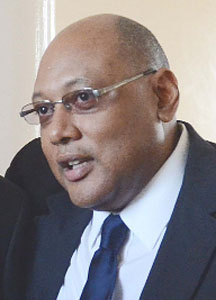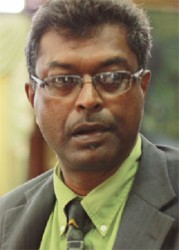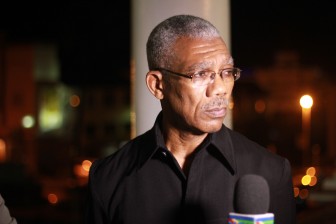With the annual recess over, a date for the first sitting of the National Assembly could be decided upon at a meeting of the Parliamentary Manage-ment Committee (PMC) tomorrow, according to Speaker Raphael Trotman.
Trotman did not say whether he would make a decision and set a date, which is within his authority, if the government fails to make a request for a sitting.
Clerk of the National Assembly Sherlock Isaacs told Stabroek News that up to yesterday no request was formally given to him by either the government or the Speaker to set a date, so he could not give a definite answer as to when the first sitting would happen.


With the AFC pushing for its no-confidence motion against the Donald Ramotar administration to be placed on the Order Paper and given priority for the first sitting, many observers were anticipating that the National Assembly would reconvene within the first week after the end of the recess.
The Assembly usually convenes on Thursdays for government business. However, it is unlikely given that the meeting of the PMC is set for Wednesday that an Order Paper would be decided upon and the Assembly would be called to convene within a 24-hour period.
Trotman had indicated that the no-confidence motion could remain on the agenda for quite some time as there are a number of other important items to be dealt with, including some like the Telecom-munications Bill, which has been on the agenda for years.
While agreeing with Trotman, AFC leader Khemraj Ramjattan has said that the AFC believes that the no-confidence motion should take precedence over all other items as it is of “utmost importance.” He charged that the PPP/C-led administration has committed a number of constitutional violations and would lead the country into a crisis should it be allowed to continue.
Ramjattan had previously told Stabroek News that the mover of the motion – in this case AFC executive member Moses Nagamootoo – can request that Standing Order 8 of the parliamentary rules be observed, which would see the motion being given priority over all other business in the National Assembly.
To date there has been no formal engagement between President Donald Ramotar and either APNU leader David Granger or Ramjattan on a way around the no-confidence motion, which, if passed, would trigger general elections within 90 days.
Observers have said that the political parties are playing a very dangerous game, with neither of the three willing to compromise.
Although governments would generally not risk having a no-confidence motion passed and instead would call for an early election, the administration has signalled that it would not pursue such a tactic.

While the APNU has given a firm commitment that it will vote alongside the AFC against the government on the motion, Granger has also been leading a campaign for the holding of long delayed local government elections, which has led to accusations that his coalition is sending mixed signals.




